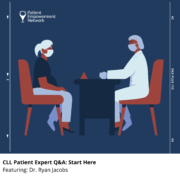What Factors Impact CLL Treatment Options?
What Factors Impact CLL Treatment Options? from Patient Empowerment Network on Vimeo.
What are the factors that impact chronic lymphocytic leukemia (CLL) treatment options? Dr. Lindsey Roeker notes important considerations that play a role in providing personalized care.
Dr. Lyndsey Roeker is a hematologic oncologist at Memorial Sloan Kettering Cancer Center. Learn more about Dr. Roeker here.
Related Resources

Why Should CLL Patients Speak Up About Treatment Side Effects? |

Is the COVID-19 Vaccination Safe for CLL Patients in Treatment? |

|
Transcript:
Katherine:
What about the impact of testing, overall? Why is it so important?
Dr. Roeker:
So, as we’ve moved from a disease that was really only treated with chemoimmunotherapy, to one that has targeted drugs available, knowing your IGHV mutational status really impacts what your frontline treatment options are. That’s the major therapy-defining risk factor. The other mutations help you know what to expect. So, for patients who have deletion of 17p or TP53 mutation, it’s possible that the treatments are going to, overall, work for a shorter period of time.
All that being said, every person is an individual, and it’s hard to predict exactly how long someone’s going to respond, from an individual basis. So, what I tell my patients is, “I could tell you what 100 of people with exactly your same disease would do, on average, but I can’t tell you exactly what’s going to happen for you. And that’s a journey that we’re going to take together and really understand over time.”
Katherine:
What are other important factors to consider, like a patient’s age, that can help them access the best treatment for their CLL?
Dr. Roeker:
So, age is important. Other medical problems is actually a very important consideration.
So, these medications have different side effect profiles and behave differently in different people. So, the BTK inhibitors, specifically ibrutinib is the one that we have the most data on, has cardiovascular side effects, so it can cause atrial fibrillation. It can cause high blood pressure. So, for patients who have preexisting heart disease, or preexisting atrial fibrillation that has been hard to control, or blood pressure that has been hard to control, for those people, I think adding in a BTK inhibitor can be a bit more of a higher risk situation than in somebody without those preexisting problems.
Venetoclax (Venclexta) is a pill that causes the cell to burst open rapidly, and it kills cells very quickly. Because of that, the major side effect is called tumor lysis syndrome, and tumor lysis syndrome is basically the cell opens up and all of the salt inside of it goes into the bloodstream.
And that salt can actually be really hard on the kidneys. So, for people who have kidney problems, venetoclax can be somewhat more challenging to use and just requires a higher level of vigilance. So, for patients who have preexisting kidney disease or the idea of a lot of monitoring and things like that, is more challenging. Then maybe the BTK inhibitors are a better choice.









